A year in exile: Dissidents expelled from Nicaragua reinvent themselves in the US
Opponents of Ortega’s Sandinista regime have been stripped of their nationality and are trying to start over thousands of miles from home: ‘I will not let Ortega and Murillo steal my dreams’
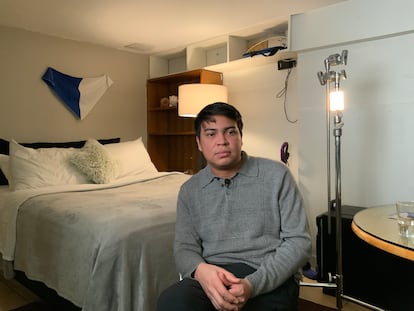

Miguel Flores has been living for the past three months in a rented basement in northeast Washington D.C. It is clear from the way he has decorated the small space containing his bed, a kitchenette and bathroom that he has a passion for cooking. The shelves are lined with recipe books, a paella pan hangs on one wall, and there are a range of utensils on the aluminum table which stands next to a well-ordered pantry. Taped to the refrigerator door, there’s a pop stick with the message: “From across the seas / Your passion follows with hope / A lovely kitchen.”
“It’s something they gave me on a cooking course, and I treasured it. It represents my dream of becoming a chef,” says Flores, 26, who, in the early morning of February 9, 2023, was deported as a “traitor” from his native Nicaragua by president Daniel Ortega and his wife vice-president Rosario Murillo’s Sandinista regime along with 221 others. In Nicaragua, he was a leading university activist, imprisoned, he explains, for simply “being an opponent.”
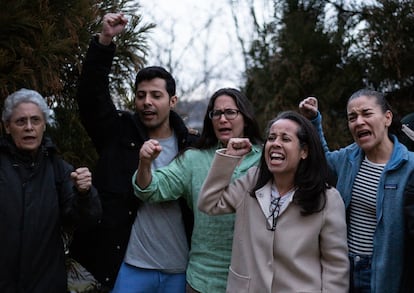
“For being against the government,” he says. “For raising my voice. For defending human rights. Everything we have been doing since the protests in 2018. And then came that conviction for conspiracy and a raft of political crimes,” he adds in a calm voice, as if the humiliation of the interrogations to which he was subjected in his underwear, and the thirst he felt being deprived of water for 48 hours, had happened decades ago.
The interview with Flores is part of a documentary for Raza e Igualdad, an organization that defends political prisoners in the Americas and which, at the request of the State Department, was instrumental in receiving the 222 political prisoners that were sent into exile — of which Flores was one — and in helping them settle in the U.S.
“I’m not going to let Ortega and Rosario steal all my dreams,” Flores explains, indicating a cast-iron resilience. “When I was imprisoned, I had dreams. I told myself that when I got out of prison, I was going to finish my degree in Political Science while continuing to set up my catering business, because I cook all kinds of things. I was doing well despite the disaster in the country. That’s why I decided to stay and not go into exile. But, well, I was arrested in Rivas by the army and they handed me over to the police.”
Flores was released on February 9, 2023. Unusually early that morning he heard the sounds of police patrols entering District III where he was being held. The guards took him out of his cell and put him on a bus whose windows had been blacked out with cloth. But, looking through the cracks, Flores saw that they were taking him to Managua’s International Airport.

When he got off the bus, he saw a huge plane on the runway and a handful of U.S. embassy officials. He had never flown in his life. Talking to the other political prisoners, he understood that the Sandinista government was releasing them and sending them to another country. It was a bittersweet moment: he was being sent into exile; the final destination, he learned, was Washington D.C.
The plane carried the 222 political prisoners north, with Flores experiencing his first ever flight under strange mandatory conditions. After landing, he would be faced with the devastating realization that the Sandinista regime had stripped him of his Nicaraguan nationality.
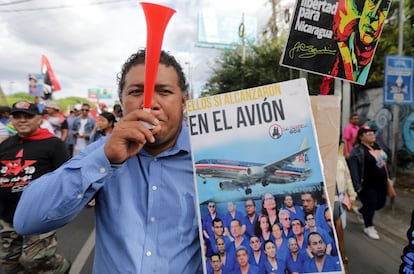
“When I got over the initial shock and the immigration process — the Humanitarian Parole — that would allow us to live in the United States was explained to us, I realized that I had no clothes nor anyone I knew in this country. I was very cold,” Flores recalls. Indeed, it was a winter morning in Dulles, Virginia, when the 222 Nicaraguan exiles touched down and the uncertainty and lack of family and friends in a foreign land made everything feel colder. Flores and his fellow exiles rummaged through a pile of coats that an NGO had provided. The act of finding one in their size brought a sense of relief in the midst of all the chaos.
A group of young people got together to help. They started looking for who could house the exiled dissidents after the three days of hotel accommodation organized by the State Department — the Joe Biden administration institution that coordinated their rescue — ran out. Flores found some friends that were living in Washington D.C. and they offered him free room and board for several months until he got on his feet.
“The real story in exile began when I asked myself, ‘What do I do? I have no job, I have nothing,’” says Flores a year after his expulsion. “A few days later I went for a long walk, sat down in a café and encountered the first barrier: language. I told myself I have to learn English and applied for my work permit.”
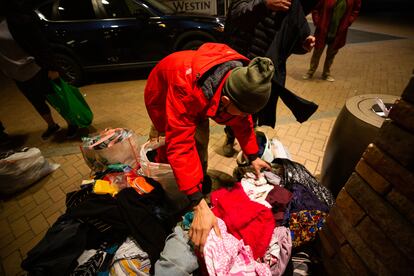
It took more than two months for Flores to be granted a work permit. He felt bad for his friends because they were covering his living expenses. But he used that time to study English and to find his way around Washington D.C., discovering a country different in so many ways from the one he had left. The first job he found was as a gardener which was welcome at the time, though his hands bear the signs of having worked outdoors in both sweltering and freezing temperatures.
“My thinking was that I was in this country on vacation. It didn’t sink in that I had to start living here. But when I began working I got myself sorted, and I also realized that I didn’t want to be a gardener. That I wasn’t going to allow Ortega and Rosario to take away my dreams,” says Flores. “I had dreamed of opening a restaurant in Nicaragua. I like to stress that, because I saw myself investing in my country. So I started making typical food, like nacatamales here, thinking I would start over doing something I liked. The response from the Nicaraguan community was incredible. They started to buy my food, to support me, and I managed to make a living from it.”
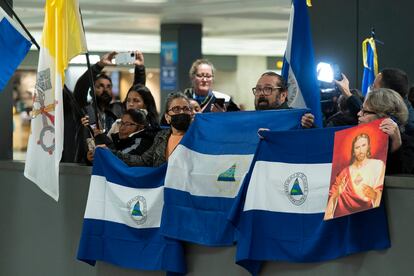
While making Nicaraguan food to survive, and treating an illness that hospitalized him and generated a bill he is still paying off in installments, Flores “looked for other opportunities.” He found a scholarship in culinary training for people moving through the asylum process. It was “perfect” because he was paid while he trained.
“I had doubts and fears about applying because I hadn’t mastered the language,” he says. “I didn’t feel qualified. But even though I wasn’t sure about what I was doing, I wrote them and they accepted me. I left my friends’ house, moved from Maryland to D.C., and started to professionalize, because I want to be a chef. I did it alone and it was hard; Christmas was hard, but I kept telling myself that I was not going to let Ortega and Rosario make me feel like a worm. They banished me and took away my nationality, but they were not going to steal my happiness, or my goals and dreams.”
When he finished the course, one of his lecturers gave him the pop stick that Flores keeps as a kind of good luck charm because it very quickly brought him luck: “From across the seas / Your passion follows with hope / A lovely kitchen.” He immediately found a job at a five-star hotel in Washington and has since managed to get himself appointed head of one of the cooking departments. “Miguel Flores has a dream to fulfill,” he says with a smile.
According to a database constructed by the Nicaraguan diaspora’s New York New Jersey Work Table, most of the 222 exiles settled in the state of Florida, specifically in Miami, where English is not so essential. Sixty-eight of them live in Florida, 33 settled in Maryland, 21 in California and the rest are scattered between North Carolina, Colorado, Georgia, Illinois, Indiana, Minnesota, Nebraska, New York, New Jersey, Oregon, Ohio, San Diego, Pennsylvania, and Tennessee.
Their geographical spread reflects the fact that Nicaraguans in exile move wherever they can find work. Some combine long working days with opposition activism. Others have joined the universal justice process as victims, like Evelyn Pinto, a 63-year-old who swears “that she will not rest until she gets justice.”
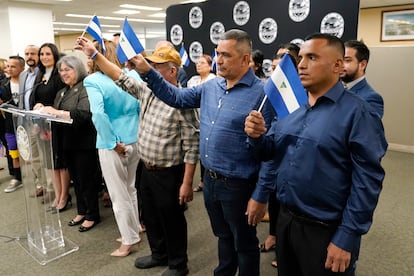
“Since my release, I have been in touch with organizations such as the Legal Defense Network (UDJ) — lawyers who are now reviewing my case in order to file a future complaint so I get justice for everything they did to me,” says Pinto, speaking from Glen Burnie, Maryland, a quiet town where she lives with her daughter and works in pedagogy online. Pinto is religious and clings to her faith when she feels lonely and struggles with everyday tasks like going to the grocery store alone.
Further south, in Miami, farmer Armando Robles found peace in exile when he was finally reunited several months ago with his wife and seven-year-old son, a lively little boy who already speaks some English, a language his father keeps battling with in order to “have a better future.”
“If one day I were to return to Nicaragua, if it were today or tomorrow, I would go back immediately, but I’m also thinking,” says Robles. “There are other things that motivate me, like having my son in school. This is a country of opportunities, opportunities that we did not have in Nicaragua. In the United States life is hard, this is where we are going to be, but I cannot forget my people, my family, my country and my life.”
Robles speaks from his Miami apartment, which he shares with another two families. Every Sunday night, they watch the news on Hispanic channels to “understand better” the country that has given them refuge. The interview with Robles takes place precisely on a Sunday, after the news, and, afterwards, Robles bids us farewell with a smile and a yawn. Tomorrow, Monday, he will be up early to work in the cold room of a company that imports flowers from Guatemala.
Sign up for our weekly newsletter to get more English-language news coverage from EL PAÍS USA Edition
Tu suscripción se está usando en otro dispositivo
¿Quieres añadir otro usuario a tu suscripción?
Si continúas leyendo en este dispositivo, no se podrá leer en el otro.
FlechaTu suscripción se está usando en otro dispositivo y solo puedes acceder a EL PAÍS desde un dispositivo a la vez.
Si quieres compartir tu cuenta, cambia tu suscripción a la modalidad Premium, así podrás añadir otro usuario. Cada uno accederá con su propia cuenta de email, lo que os permitirá personalizar vuestra experiencia en EL PAÍS.
¿Tienes una suscripción de empresa? Accede aquí para contratar más cuentas.
En el caso de no saber quién está usando tu cuenta, te recomendamos cambiar tu contraseña aquí.
Si decides continuar compartiendo tu cuenta, este mensaje se mostrará en tu dispositivo y en el de la otra persona que está usando tu cuenta de forma indefinida, afectando a tu experiencia de lectura. Puedes consultar aquí los términos y condiciones de la suscripción digital.








































